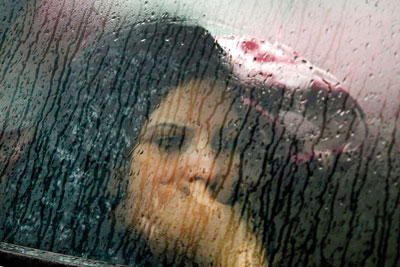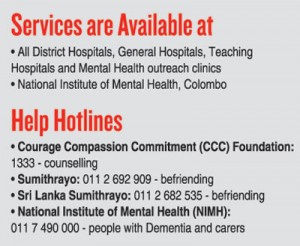News
Depression: You’re not alone, seek help
 You are not alone.
You are not alone.
Do you feel life is not worth living? Are you worried about the future? Wondering why your new baby is not making you happy?
Whatever life may throw at you, you are not alone – seek help and support, for depression is preventable and treatable.
Many eminent and famous personalities worldwide and even in Sri Lanka are having or have had depression. Among them are the 16th American President Abraham Lincoln; British Prime Minister Sir Winston Churchill; one of the first two men on the moon, Buzz Aldrin; German composer and pianist Ludwig van Beethoven; and Princess Diana. So you are not alone.
This is the strong message that reverberated on Wednesday with regard to depression faced by millions across the world and more than 800,000 in Sri Lanka, with a very real danger of this mental illness being suicide.
An in-depth look was cast not only at this serious mental health challenge but also how to overcome it, while dispelling stigma, at ‘Depression: Let’s Talk’, a media conference organised by the World Health Organization (WHO) Country Office in collaboration with the Health Ministry at the Government Information Department auditorium at Polhengoda.
Focusing on the reality of the Sri Lankan situation, the Health Ministry’s Director of Mental Health, Dr. Chithramalee de Silva said that 10% of the population is affected by mental health problems, with 2% of the population suffering from major psychiatric disorders such as severe depression, schizophrenia and bipolar disorder.
Nearly 3,000 people commit suicide every year, was a chilling statistic highlighted by Dr. de Silva, who also pointed out that 40% of men and 2.4% of women above 15 years of age use alcohol, while substance abuse also remains a challenge.
With the underlying factors for mental-health problems/disorders being biological, psychological, social, environmental and economic, she stressed that the health sector cannot work alone to improve mental health.
She spelled out the strategies in mental health improvement as promotion of mental wellbeing; standard patient-care; prevention of suicide; prevention of violence; reduction in alcohol-related harm and substance abuse; and improvement in infrastructure and human resources.
Calling the media “a strong vehicle” to promote mental wellbeing and community awareness on mental wellbeing and mental illness and also eliminate stigma and discrimination, Dr. de Silva urged the media to act responsibly. “Unethical reporting could lead to adverse outcomes such as a high rate of suicide, increase in violence, increase in the use of alcohol and drugs.”
Investing in mental health today can generate enormous returns in terms of reducing disability and preventing premature deaths, she said, adding that the priorities are well known. Therefore, it is our responsibility to turn possibilities to reality.

Earlier, WHO’s Acting Country Representative Dr. Belinda Loring said that each year on the WHO’s birthday (World Health Day), a globally important health topic is picked to be tackled worldwide. This year it is depression. It is a big problem, a growing problem and a human problem.
Depression can be treated and managed. There is no need to suffer in silence. The right care allows those with depression to lead normal happy lives. Depression is an avoidable tragedy.
Highlighting the clinical features of depression, Consultant Psychiatrist Dr. Neil Fernando says they are negative thoughts, negative emotions and negative behaviour.
Talk to someone, he says, if you are feeling depressed. Citing examples, Dr. Fernando explains that mothers and daughters could talk to each other, students with teachers, men to men at the workplace and young girls and elderly women.
Otherwise, the impact of depression is horrendous – physical disease, disability and suicide, he added.
Dealing with why depression concerns us all, WHO’s Mental Health Officer Suveen Thirapathy said that depression can affect anyone. The most vulnerable are those in the age-group 50-69 years, followed by those 70+ and then by those in the 15-49 year age-group.
In Sri Lanka, when looking at health problems that cause the most disability, he said added that depression disorders came in 5th and anxiety disorders 9th.

| Campaign to promote positive wellbeing With ‘Depression: Let’s Talk’ being the theme of World Health Day next Friday (April 7), the campaign to tackle it will be launched at Independence Square between 7.30–9 a.m. with the promotion of positive wellbeing. An early morning yoga session will be followed by none other than President Maithripala Sirisena and Health Minister Dr Rajitha Senaratne inaugurating the campaign. Thereafter, from 10 a.m. to 5 p.m. yoga, music, drama and art therapy sessions will be held as well as an exhibition by all the stakeholders providing mental health services in Sri Lanka, at the Independence Day Memorial. The campaign, meanwhile, will reach a peak on World Mental Health Day on October 10. |
| It’s an illness not character weakness Depression is an illness and not a character weakness. Depression can be treated. What treatment is best and how long the depression lasts depend on the severity of the depression. The support of carers, friends and family facilitates recovery from depression. Patience and perseverance are needed, as recovery can take time. Stress can make depression worse. Numerous leaflets from the Health Ministry and the WHO provide answers as to what to do if you think you are depressed or what can be done by you for others who are depressed. What you can do if you think you are depressed: Talk to someone you trust about your feelings. Seek professional help – the local health-care worker or a doctor. Remember that with the right help, you can get better. Eat regularly and get adequate sleep Stay connected. Keep in contact with family and friends. Exercise regularly, even if it’s just a short walk. Engage in meditation and mindfulness Accept that you might not be able to accomplish as much as you usually would. Break up large tasks into smaller activities. Avoid or restrict alcohol intake and refrain from using illicit drugs as they worsen depression. Expect your mood to improve gradually. Replace negative thoughts with positive thoughts. If you feel suicidal, seek help immediately. What you can do for people who are depressed: Make it clear that you want to help, listen without judgement and offer support. Find out more about depression. Encourage them to seek professional help. Offer to accompany them to appointments. If medication is prescribed, help them to take it as prescribed. Be patient as it usually takes a few weeks to feel better. Help them with everyday tasks and to have regular eating and sleeping patterns. Encourage regular exercise and social activities. Encourage them to focus on the positive, rather than the negative. If they are thinking about self-harm or have already intentionally harmed themselves, do not leave them alone. Seek further help from emergency services or a health-care professional. In the meantime, remove items such as medications, sharp objects and firearms. Take care of yourself too. Try to find ways to relax and continue doing things you enjoy. |

